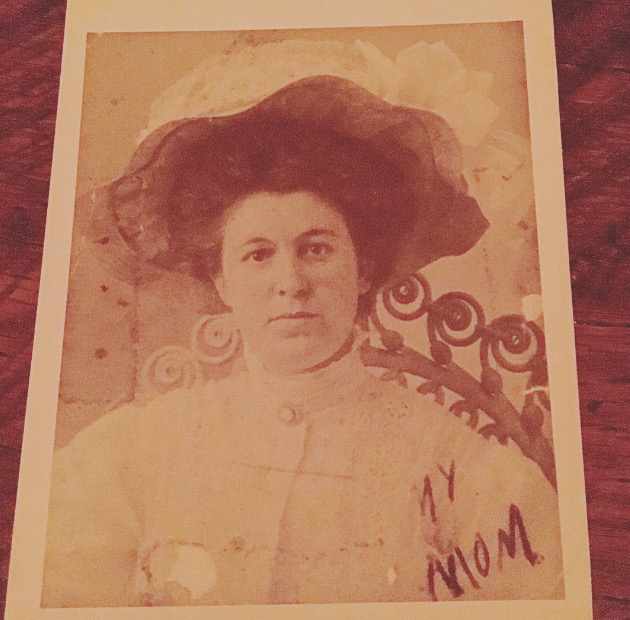I come from a family of great storytellers. My mother engages her classroom through stories both scholarly and personal. My grandparents seemingly had practiced telling various stories, each knowing when to pick up and deliver punch lines that the other had left up for the assist. Most would question the authenticity of several stories—like the time my dad successfully gave our Jack Russell the Heimlich after choking on a checker, or when Dadu was mistakenly thrown into jail and set his prison mattress on fire in protest (it takes all kinds, folks). For better or worse, to my knowledge most are true, or only slightly embellished. Maybe it’s not the storytelling that’s so brilliant, but the unique and complex characters from my family tree that make these stories so unforgettable.
We’ve had an uncharacteristically warm winter, but with each blowing snow—as it here now—I think of Mommy (Izetta) Burgess and the Flu Epidemic of 1918.
Izetta was my great-great-grandmother. By the time the contagious virus had reached Kentucky, Poppy Burgess had long passed away from a liver-level mule kick. His widow tended to their seven children and ran the family farm in a Greenup County, Kentucky hollow (pronounced “holler”).
I’ve always found comfort when nestled in the high reaching hills of a hollow. The wind blocking warmth of the hollows and limited exposure has always provided a false sense of security to me. In reality, the too-dark hollows are treacherous land for flooding, mudslides, and slow-melting ice. Story goes that the snow was deep, the ice clung to the frozen hillsides, and everyone had shut themselves in their homes as best as they could in attempts to stay warm and survive. The isolated Appalachians withdrew from society even more.
Deeper in the hollow, another fatherless family had been doing their best to just survive the winter. The 1918 flu pandemic is the deadliest in modern history, infecting approximately a third of the world’s population at that time, killing more than the fatalities of World War I. The young, desperate family deep in the woods that caught the flu hardly stood a chance.
Izetta charged her boys with daily firewood, milk, bread, and soup deliveries throughout the cold winter. I remember my mother telling me about how the boys had been so afraid they would take sick, but I believe God listened to Izetta’s prayers for protection and healing. She believed in hot food, a heated house, and warm gestures of generosity, but most importantly: an Almighty God.
When God told us to “love your neighbor as yourself,” He definitely did not limit our love to those that lived on the same hillside. However, I can’t imagine how this verse didn’t resonate with Izetta every day as she potentially sacrificed her own family’s wellbeing to take care of her neighbor. I also imagine that Izetta was able to teach her children by example a pure and perfect religion, that is: caring for the widows and orphans (James 1:27).
Today, our neighbors still need help—be it firewood, utility bill assistance, or just a kind word. It’s up to the church to care for these people. As followers of Christ, we live by a different set of standards, a higher calling. We are distinguishable by our compassion for our fellow man, starting with those in line with us at our neighborhood grocery and reaching to the ends of the earth via missions and support. We pray that our actions exemplify Christ and that our beneficiaries come to know His grace.
Fortunately for us, charity and love are as infectious as the deadliest of viruses….and every good story has a happy ending. Of Izetta’s seven children, six were boys and one was my great-grandmother, Marjorie (Dadu’s mother). Years later, Izetta had passed away and Dadu had been in need of a good job. During an interview at a local factory, a man told Dadu he was certainly hired. He then proceeded to tell him how when he was once a toddler in a poor, desperate hollow, sick with the flu in 1918. Izetta Burgess and her family—Dadu’s family—had saved him, his siblings, and his mother.
The seeds of kindness and love planted in even the harshest of winters will reap a harvest of blessings (Galatians 6:7). In a time where there is so much uncertainty and turmoil, God alone remains constant, and He remains faithful. Obedience is true and perfect worship (Romans 12:1-2). May we be obedient: to love God and serve all people….be unstained by this world, but rather renewed by His Word… and care and love the least of these. Amen.
Referenced Verses:
- “The second is this, ‘YOU SHALL LOVE YOUR NEIGHBOR AS YOURSELF.’ There is no other commandment greater than these.” Mark 12:31 (NASB)
- Pure and undefiled religion in the sight of our God and Father is this: to visit orphans and widows in their distress, and to keep oneself unstained by the world. James 1:27 (NASB)
- Don’t be deceived: God is not mocked. For whatever a man sows he will also reap. Galatians 6:7 (HCSB)
- Therefore, I urge you, brothers and sisters, in view of God’s mercy, to offer your bodies as a living sacrifice, holy and pleasing to God–this is your true and proper worship. Do not conform to the pattern of this world, but be transformed by the renewing of your mind. Then you will be able to test and approve what God’s will is–his good, pleasing and perfect will. Romans 12:1-2 (NIV)
*Pictured: Izetta Burgess
